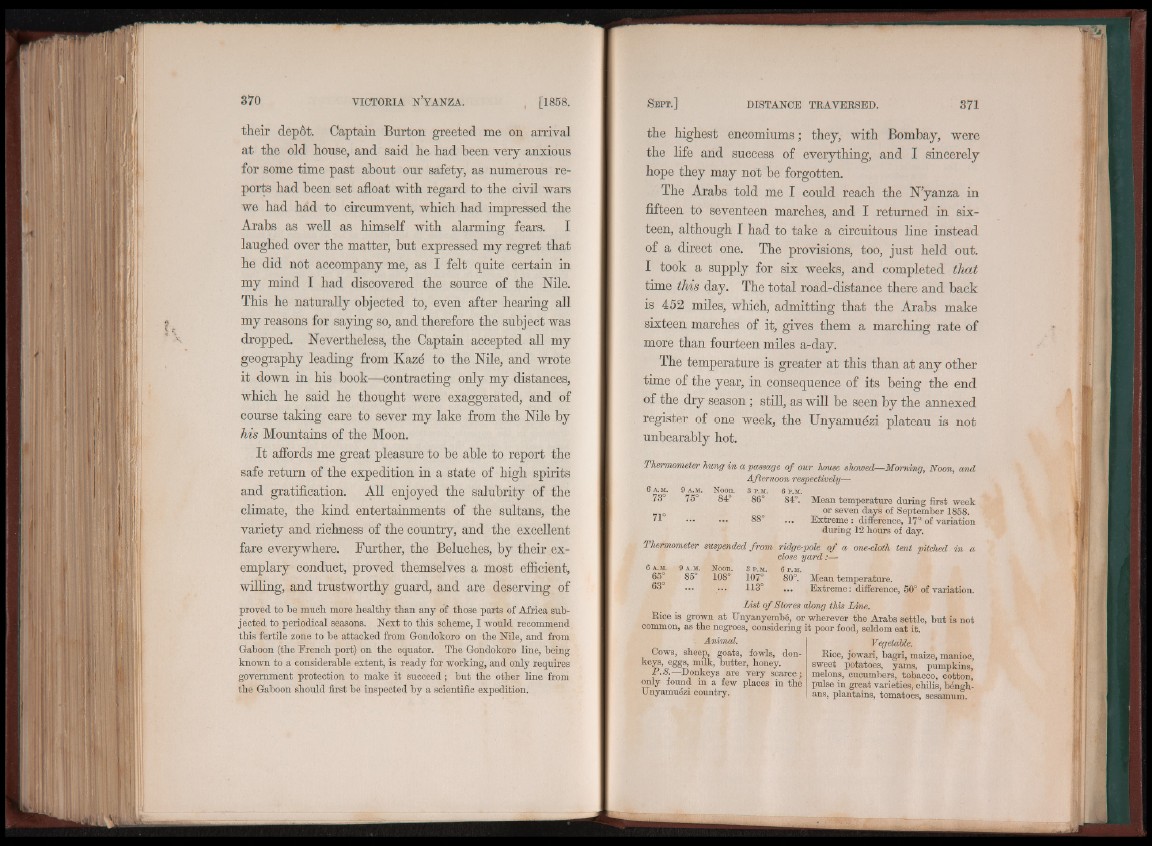
their dépôt. Captain Burton greeted me on arrival
at the old house, and said he had been very anxious
for some time past about our safety, as numerous reports
had been set afloat with regard to the civil wars
we had had to circumvent, which had impressed the
Arabs as well as himself with alarming fears. I
laughed over the matter, but expressed my regret that
he did not accompany me, as I felt quite certain in
my mind I had discovered the source of the Nile.
This he naturally objected to, even after hearing all
my reasons for saying so, and therefore the subject was
dropped. Nevertheless, the Captain accepted all my
geography leading from Kazé to the Nile, and wrote
it down in his book—contracting only my distances,
which he said he thought were exaggerated, and of
course taking care to sever my lake from the Nile by
his Mountains of the Moon.
I t affords me great pleasure to be able to report the
safe return of the expedition in a state of high spirits
and gratification. All enjoyed the salubrity of the
climate, the kind entertainments of the sultans, the
variety and richness of the country, and the excellent
fare everywhere. Further, the Beluches, by their exemplary
conduct, proved themselves a most efficient,
willing, and trustworthy guard, and are deserving of
proved to be much, more healthy than any of those parts of Africa subjected
to periodical seasons. Next to this scheme, I would recommend
this fertile zone to be attacked from Gondokoro on the Nile, and from
Gaboon (the French port) on the equator. The Gondokoro line, being
known to a considerable extent, is ready for working, and only requires
government protection to make it succeed ; but the other line from
the Gaboon should first be inspected by a scientific expedition.
the highest encomiums; they, with Bombay, were
the life and success of everything, and I sincerely
hope they may not be forgotten.
The Arabs told me I could reach the N’yanza in
fifteen to seventeen marches, and I returned in sixteen,
although I had to take a circuitous line instead
of a direct one. The provisions, too, just held out.
I took a supply for six weeks, and completed that
time this day. The total road-distance there and back
is 452 miles, which, admitting that the Arabs make
sixteen marches of it, gives them a marching rate of
more than fourteen miles a-day.
The temperature is greater at this than at any other
time of the year, in consequence of its being the end
of the dry season; still, as will be seen by the annexed
register of one week, the Unyamudzi plateau is not
unbearably hot.
Thermometer hung in a passage of our house showed—Morning, Noon, and
Afternoon respectively—
6 a .m. 9 a .m. N o o n . 3 p .m . 6 p .m .
73° 75° 84° 86° 84°. Mean temperature during first week
^ o or seven days of September 1858.
' ••• ••• 38 ... Extreme: difference, 17° of variation
during 12 bours of day.
Thermometer suspended from ridge-pole of a one-cloth tent pitched in a
close yard:—
6 a .m. 9 a .m. N o o n . 3 p .m. 6 p .m .
65q 85° 108° 107° 80°. Mean temperature.
63 ••• ,••• 113° ... Extreme: difference, 50° of variation.
List of Stores along this Line.
Rice is grown at Unyanyembg, or wherever the Arabs settle, but is not
common, as the negroes, considering it poor food, seldom eat it.
. Animal.
Cows, sheep, goats, fowls, donkeys,
eggs, milk, butter, honey.
P.S.—Donkeys are very scarce;
only found in a few places in the
0 rryamuezi country.
Vegetable.
Rice, jowari, bagri, maize, manioc,
sweet potatoes, yams, pumpkins,
melons, cucumbers, tobacco, cotton,
pulse in great varieties, chilis, béngh-
ans, plantains, tomatoes, sesamum.